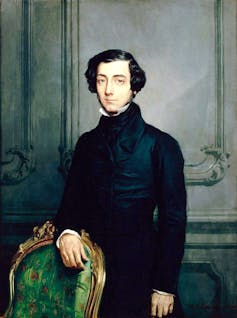Much of the anger at the federal budget is explained by a French political theorist who died 155 years ago. In one of the most prescient analyses of where democracy was heading, Alexis de Tocqueville warned us about a “soft despotism”. The response to Tony Abbott and Joe Hockey’s budget reveals how far this despotism has penetrated Australian political discourse.

The passage appears in the closing pages (pp. 1245-61) of Tocqueville’s Democracy in America (1840). What sort of despotism (or dictatorship), he asks, do democratic peoples have to fear? Dictators, in the history Tocqueville surveyed, had lacked the means of total control:
Their tyranny weighed enormously on some, but it did not extend over many…it was violent and restricted.
Democratic soft despotism was the opposite. It would be milder but pervasive; “it would degrade men without tormenting them”. By giving people what they wanted it would infantilise them. People would live under “an immense tutelary power”:
…absolute, detailed, regular, far-seeing, and mild. It would resemble paternal power if, like that, it had for its object to prepare men for manhood; but on the contrary, it seeks only to keep them fixated irrevocably in childhood…it provides for their security, foresees and secures their needs, facilitates their pleasures, conducts their principle affairs, directs their industry, regulates their estates, divides their inheritances; can it not take away from them entirely the trouble of thinking and the pain of living?
Students, especially, have a hard time with this (which in part explains why Tocqueville is so little studied today). How could a system that privileges equality and democracy, that is supposedly responsive to human need, damage the human spirit? Surely, equality is where we all should be tending? After all, governments and universities – as key agents of the tutelary power – recruit commissars to enforce equality and we all say “yay!”
Race, sex, gender, economics, education, health care, dignity, respect, approval, worth – all must be equalised, made neutral, in their effects by federal legislation.
Tocqueville was enormously impressed by the democratic experiment in the United States – but he was fearful too. While it would mean a far higher level of material prosperity, it would also enervate the soul. There would be less striving – if only because there was less to strive for.
Democratic society would make us duller, less imaginative, and yet more entitled. We would come to define ourselves by our dependence on government – the great enforcer of equality – rather than on our own individuality.
The economic debate over the federal budget is less revealing than the mindsets exposed in the wide-ranging reaction to it. The outrage is informed less by a different reading of the balance sheet and more by claims that the Commonwealth is thinning the security blanket. Expecting people to contribute more to their own health care, for example, is not viewed as a small liberation from government control but as a denial of social protection.
We are affronted that people should fend for themselves more. Dependence is preferred over independence, more government over less.
The loudest shouts are often from students demanding the government pay for their education. I have still yet to see a campus protest aimed at getting Canberra off their backs. Only a “free education”, we are told, guarantees equality of access. In fact, it doesn’t; it just means the middle classes get to send their children to university at the expense of the tradies and bin collectors who pay taxes but don’t enjoy that privilege.
Measures to get the young unemployed to “earn or learn” (under Newstart) are denounced as forcing the pain of living on vulnerable people. Two-thirds of Age readers would rather the government fund the lifestyles of able-bodied 18-30 year olds than see them suffer the indignity of labour on a fruit farm.
Tocqueville would nod at all this and say “I told you so!” The ease of life in Australia has made us falsely connect our fortune with federal government activism and overly sensitive to its apparent reduction. We seem to crave an authority that fosters our dependence. Abbott and Hockey have channelled their inner Tocqueville and in doing so have irked a number of soft despots – but as the Frenchman warned, it is the despots who will win in the end.
